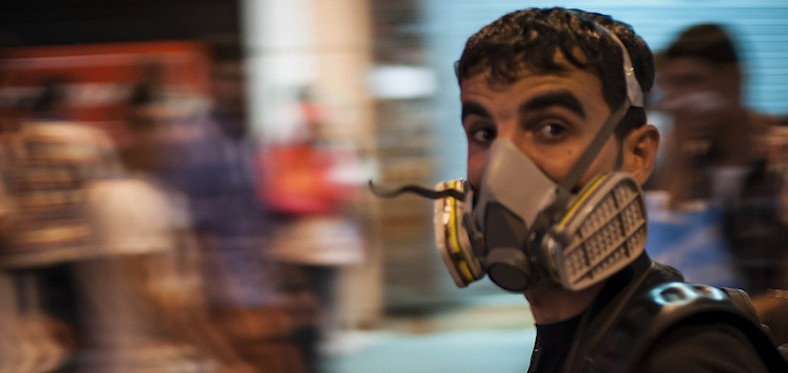Judicial Defense
Turkey is deeply split between supporters of Prime Minister Recep Tayyip Erdogan and the opposition. The constitutional court remains one of the few buffers between them. But is this enough to uphold democracy?
In Turkey’s local elections at the end of March, the ruling Development and Justice Party (AKP) won a landslide victory gaining 45.6 percent of the votes. Prime Minister Recep Tayyip Erdogan’s party won despite corruption investigations against his children and cabinet members, his heavy-handed rule during the Gezi Park protests last year, and the continuing attempts to curb freedom of expression. The election result might give Erdogan now enough confidence to run for president in August 2014, as many political observers expect, and to further consolidate his powers in Turkey’s political system.
According to the latest Turkey report of the Bertelsmann Stiftung’s Transformation Index (BTI), which examines governance in transition countries, the political management performance of the Turkish leadership is in general stable. The report finds that “a harmonious performance on all levels of management necessitates political stability”. On various indicators of political management Turkey receives very good scores in the Bertelsmann assessment. On policy implementation and coordination, for instance, it gains 9 out of 10 points.
However, the BTI report also notes that Turkey exhibits fundamental shortcomings in various other areas of governance. Participation opportunities for civil society, for instance, are limited and civil society institutions critical of the government or advocating policies deemed against the interests of the government often face severe difficulties.
Jailed journalists and self-censorship
The Bertelsmann Stiftung’s Sustainable Governance Indicators (SGI) project, which examines governance in the OECD and European Union, comes to a similar conclusion when looking at further indicators of democratic quality such as freedom of expression and media freedom. The SGI ranks Turkey dead last on 41th place on quality of democracy.
One reason for the lack of democratic quality is the Turkish government’s weak commitment to freedom of expression. In March, it banned the messaging service Twitter and the video platform YouTube for airing leaked tapes that support corruption claims against the Prime Minister and the government causing a nationwide outcry. The World Press Freedom Index 2013 ranks Turkey 154th out of 179 countries. According to the SGI report, the “increasing tendency to jail those working in media (…) has undermined media independence and has encouraged self-censorship“.
Comparing all OECD and EU countries, the SGI ranks Turkey second last in terms of the public’s and the media’s access to information, which aggregates the performance of indicators related to media independence and freedom of expression. On media freedom, the SGI ranks Turkey last in its international comparison, awarding it just 3 of 10 possible points.
Constitutional court defends civil liberties
One of the few institutions which effectively oppose some of the government’s anti-democratic actions is Turkey’s constitutional court. Since its creation in 1960 it plays a central role in Turkish politics. The court’s major purpose is to guard the constitutional order. After the government recently banned various social media sites the constitutional court intervened. At the beginning of April it ruled that the ban on Twitter was illegal and a breach of freedom of expression laws. It called the ban “illegal, arbitrary and a serious restriction on the right to obtain information.”
Shortly after the lift of the Twitter ban Turkey’s highest court also rejected central elements of the government’s judicial reform as unconstitutional. The judges annulled the intended expansion of power of the justice minister over the Supreme Board of Judges and Prosecutors, the council which appoints and removes judges and prosecutors. The reaction of the government to the court’s rulings was restrained. “The constitutional court’s cancellation decision has not changed my opinion. But of course we will abide by the courts decisions“, said Bekir Bozdag, the Minister of Justice.
The constitutional court’s decisions thus contribute to maintaining the independence of the judiciary and freedom of expression in Turkey. The court forms a buffer between the government and the citizens and it is one of the main checks in Turkey’s political system.
Nevertheless, Turkey’s parliament recently approved new laws to censor the Internet and to expand the powers and immunities of Turkey’s intelligence agency. This is an example of how state powers in Turkey are in principle separated; yet the checks and balances remain weak. The European Commission’s Turkey 2013 Progress Report also points out that there is still too much government influence over the High Council of Judges and Prosecutors.
Turkey remains today split between those who support the AKP and those who want Prime Minister Erdogan gone. This claim is also supported by the BTI report: “An antagonistic political climate is observable in the country. Supporters of the AKP government and its measures are pitched against defenders and partisans of the old Kemalist system and elites. Although the civilian leadership, to date, has been able to reduce the power of its opponents considerably, the underlying political tensions will remain a problem in the future. There is also the increasingly obvious problem that leading politicians of the AKP are dreaming of creating an authoritarian system”. The country must find a way to integrate different interests and minimize the threat of increasing cleavages between religious, conservative, traditional and progressive groups in society.
Hakan Demir is a political scientist and editor-in-chief of MiGAZIN, journal for migration and integration in Germany.
Related BTI
Study: BTI 2014 Report
Political Management in International Comparison
